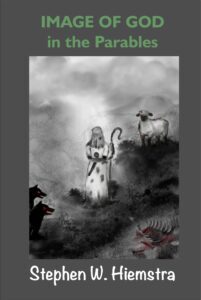The Dragnet

What man of you, having a hundred sheep, if he has lost one of them,
does not leave the ninety-nine in the open country,
and go after the one that is lost, until he finds it?
(Luke 15:4)
By Stephen W. Hiemstra
No survey of love in the parables is complete without an examination of the Parable of the Lost Sheep. While the parable clearly exhibits God’s grace, as already mentioned, it is hard to isolate this grace from hesed love. There is an implicit bond, a covenant of care, between a shepherd and the sheep—ownership implies care. Even in the case of a superpower there is an obligation to protect its weaker allies, like a mother cares for her child or a duck for her ducklings.
Still, several aspects of the Parable of the Lost Sheep are unsettling in its presentation of love, starting with the word, lost. The word, lost, in the Greek (ἀπόλλυμι, BDAG 958) can mean: “1. to cause or experience destruction; 2. to fail to obtain what one expects or anticipates, lose out on, lose; or 3. to lose something that one already has or be separated from a normal connection, lose, be lost.” How did this sheep get lost and who is responsible? Why does the shepherd leave the other ninety-nine sheep unattended while he searches for the lost sheep? It appears that the value placed on the lost sheep is imprudent, even reckless.
When we take the next step and apply this parable to sinners, this parable becomes even more awkward. Does God love sinners more than the faithful? The righteous seem to get a bum rap in this parable. Actually, the cheeky nature of this parable is the main point: We are all sinners; none are righteous; all have fallen short of the love of God. This parable makes no sense without the doctrine of original sin. The ninety-nine righteous people are an illusion—none are righteous (Luke 18:18-19). We are all lost sheep. Blomberg (2012, 216) observes that many interpret “righteous” to imply more like “self-righteous,” which speaks to a problem of religious complacency. No one wants to be seen as lost.
The Dragnet
The need for vigilance among the faithful is reinforced by the many parables focusing on judgment, like the Parable of the Dragnet. Here we read:
Again, the kingdom of heaven is like a net that was thrown into the sea and gathered fish of every kind. When it was full, men drew it ashore and sat down and sorted the good into containers but threw away the bad. So it will be at the end of the age. The angels will come out and separate the evil from the righteous and throw them into the fiery furnace. In that place there will be weeping and gnashing of teeth. (Matt. 13:47-50)
Judgment makes the point that its hard for God to love the good (righteous) if he doesn’t hate the bad (evil).
This dichotomous world of good and bad fish pictured bothers most Christians today because they reject moralistic thinking. For a first-century Jew, the picture here is of righteous people who obey the Mosaic covenant and unrighteous who do not. In the parable, the sorting of good and bad is initially done by the fishermen, who keep the good and recycle the bad. Later, these fishermen are described as angels who throw the evil into the fiery furnace without saying what becomes of the righteous.
I find it helpful to recast the dichotomous picture here as our response to pain during a Gethsemane moment. When we face a painful moment or a painful choice, do we turn to God and give it over to him or do we turn into the pain and sulk? (Matt 26:39) When we habitually do one or the other, our personalities and culture are formed and hardened. The Dragnet also suddenly becomes real, although judgment is something we impose on ourselves, not something imposed by God.
The Good News is that Christ died for our sins so we don’t have to.
The Dragnet
Also see:
The Face of God in the Parables
The Who Question
Preface to a Life in Tension
Other ways to engage online:
Author site: http://www.StephenWHiemstra.net
Publisher site: http://www.T2Pneuma.com
Newsletter at: https://bit.ly/Janu_25, Signup
The post The Dragnet appeared first on T2Pneuma.net.



